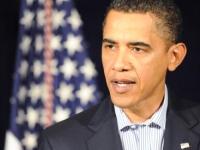BOB GARFIELD: On December 27th, two days after the failed bombing attempt of Flight 253, the Obama administration deployed Press Secretary Robert Gibbs and Homeland Security Secretary Janet Napolitano to the Sunday morning news shows.
[CLIP]:
SECRETARY JANET NAPOLITANO: One thing that I'd like to point out is that the system worked. Everybody played an important role here.
BOB GARFIELD: Republicans pounced on Napolitano’s claims, arguing that the administration’s comments, as well as the fact that the President hadn't cut short his Christmas vacation to comment personally, were evidence that Obama did not take the terror threat seriously enough. His critics insist that the administration’s rhetoric has been too weak and that the message that the U.S. will not defend itself is a signal that terrorists abroad are receiving loud and clear. Historian Joshua Geltzer, author of US Counter-terrorism Strategy and al-Qaeda: Signalling and the Terrorist World-View, says that U.S. presidents can signal two ways, through rhetoric and action. George W. Bush’s exhortation to al Qaeda to “bring it on” was one instance of rhetorical signaling, while Bill Clinton’s 1998 missile strikes on Afghanistan and Sudan, which came in response to terrorist attacks on American embassies abroad, were examples of signaling through actions. According to Geltzer, the tricky part about signaling is that U.S. presidents have to communicate with at least two audiences at once. Their words and actions are interpreted not just by terrorists but by U.S. citizens at home, not to mention allies abroad. Josh, welcome to the show.
JOSHUA GELTZER: Thanks for having me on.
BOB GARFIELD: One of the difficulties that you observe in your book is that the job of signaling potential terrorist adversaries is that it works often at cross purposes with the job of reassuring the American public about our nation’s resolve and about their own security. Can you reassure the American public without giving your terrorist enemies the opportunity to exchange high fives?
JOSHUA GELTZER: It certainly is a tension, and it may be that the best way to try to address that is not in the immediate wake of an attack, when the public really does seek reassurance, but in calmer periods. And I would emphasize the role of the government as educator of the American public that terrorism really is a strategy of provocation. On a strategic level, it relies on the fear and, in turn, political overreaction in the wake of a terrorist attack. And so, to the extent that this administration can use a period of calm as something of an opportunity to explain that it is in what we do after a terrorist attack that a terrorist either sees success or failure in what they're trying to do, that might be the best way because not only does it strengthen ourselves a bit at home, but to the extent that terrorist groups see that, that education of a sort, in progress, it may make terrorism less appealing or apparently less effective as a way to approach a country like the U.S.
BOB GARFIELD: Your fundamental conclusion is that a lot of bellicose talk and bluster is counterproductive, eh?
JOSHUA GELTZER: Yeah, there can be a lot of things that would seem useful against a traditional state adversary that really are counterproductive against a terrorist group. A state generally does not seek retaliation from its adversary. A terrorist group generally does. Its strategy relies on eliciting some sort of retaliation. In the wake of 9/11, the U.S. quite publicly spent a lot of money building up our homeland security, and there are obviously valid reasons for doing that. And to some extent there are valid reasons for wanting to publicize it, because it does seem intuitive that certain terrorists or potential terrorists might be deterred. But if you look at what terrorists seized upon in America’s reaction to 9/11, they do mention the extent that a terrorist strategy can lead a counterterrorist government to divert its own resources towards things it wouldn't ordinarily want to spend on, such as massive barricades at every airport, not to mention broader expenses like counterterrorist aid to other governments and really the biggest, our expenses in Afghanistan and Iraq. That is part of what terrorists seek to elicit with their attacks.
BOB GARFIELD: Would you recommend to a president of the United States, in the event of successful attacks, maybe in which hundreds or thousands of lives are lost, that he similarly understate the response that we don't go into full mobilization mode, we don't give succor to our terrorist enemies by overreacting, even when the damage is catastrophic?
JOSHUA GELTZER: I think that to the extent that we can react effectively but quietly, that combination is ideal, or at least the best of various tough alternatives. So, to take an example, I think this administration which has actually ramped up the Predator strikes along the Afghanistan/Pakistan border has spoken about them less than the previous administration did. So even while engaging in more of them, it’s said less about them. Now, we don't know exactly how successful these attacks have been, but the idea of doing them quietly and not exulting in particular successes may allow for the practical success without the counterproductive signaling.
BOB GARFIELD: Well Josh, thank you very much.
JOSHUA GELTZER: Thank you.
BOB GARFIELD: Joshua Geltzer is a historian, author of US Counter-terrorism Strategy and al-Qaeda: Signalling and the Terrorist World-View.
[MUSIC UP AND UNDER] Coming up, techies are all atwitter, and all a-Facebook and all a-blogosphere, over news of the long-awaited Apple tablet. This is On the Media from NPR.
[MUSIC UP AND UNDER]

